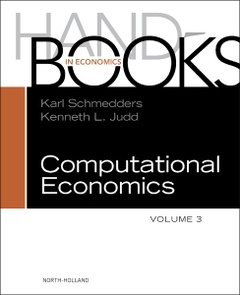Description
Handbook of Computational Economics
Handbook of Computational Economics Series
Coordinators: Schmedders Karl, Judd Kenneth L.
Language: English
Subjects for Handbook of Computational Economics:
688 p. · 19x23.3 cm · Hardback
Description
/li>Contents
/li>Comment
/li>
Handbook of Computational Economics summarizes recent advances in economic thought, revealing some of the potential offered by modern computational methods. With computational power increasing in hardware and algorithms, many economists are closing the gap between economic practice and the frontiers of computational mathematics. In their efforts to accelerate the incorporation of computational power into mainstream research, contributors to this volume update the improvements in algorithms that have sharpened econometric tools, solution methods for dynamic optimization and equilibrium models, and applications to public finance, macroeconomics, and auctions. They also cover the switch to massive parallelism in the creation of more powerful computers, with advances in the development of high-power and high-throughput computing.
Much more can be done to expand the value of computational modeling in economics. In conjunction with volume one (1996) and volume two (2006), this volume offers a remarkable picture of the recent development of economics as a science as well as an exciting preview of its future potential.
- Learning About Learning in Dynamic Economic Models - David A. Kendrick, Hans M. Amman, & Marco P. Tucci
- On the Numerical Solution of Equilibria in Auction Models with Asymmetries within the Private-Values Paradigm - Timothy P. Hubbard & Harry Paarsch
- Analyzing Fiscal Policies in a Heterogeneous-Agent Overlapping Generations Economy - Shinichi Nishiyama & Kent Smetters
- On Formulating and Solving Portfolio Decision and Asset Pricing Problems - Yu Chen, Thomas F. Cosimano, & Alex A. Himonas
- Computational Methods for Derivatives with Early Exercise Features - Carl Chiarella, Boda Kang, Gunter Meyer, & Andrew Ziogas
- Solving and Simulating Models with Heterogeneous Agents and Aggregate Uncertainty - Yann Algan, Olivier Allais, Wouter J. den Haan, & Pontius Rendahl
- Numerical Methods for Large Scale Dynamic Economic Models - Lilia Maliar & Serguei Maliar
- Advances in Numerical Dynamic Programming and New Applications - Yongyang Cai & Kenneth L. Judd
- Accuracy of Numerical Errors - Adrian Peralta-Alva & Manuel S. Santos
- GPU Computing in Economics - Eric Aldrich
- Computing All Solutions to Polynomial Equations in Economics - Felix Kubler, Philipp Renner, & Karl Schmedders
- Samples different styles and approaches, reflecting the breadth of computational economics as practiced today
- Focuses on problems with few well-developed solutions in the literature of other disciplines
- Emphasizes the potential for increasing the value of computational modeling in economics




